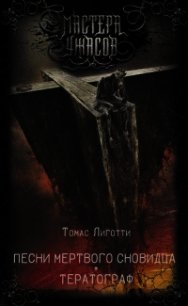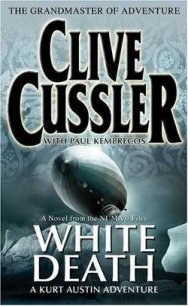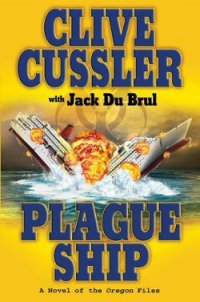Corsair - Cussler Clive (полная версия книги TXT) 📗
“Should I order the topsail and jib reefed, Captain?” asked Salvador Catalano.
“It’s best we do. The moon’s going to be bright enough later on.”
Shadows lengthened until they began to merge, and the last of the sun’s rays set over the western horizon. The ketch entered Tripoli Bay and began closing in on the imposing walls of the Barbary city. The rising crescent moon made the stones of the mole, fortress, and the Bashaw’s castle gleam eerily, while the black gun emplacements dotting the fortifications exuded an air of menace. Peeking over the wall was the thin silhouette of a minaret, from which the men on the Intrepid had just heard the call to prayer moments before sundown.
And at anchor directly below the castle lay the USS Philadelphia. She appeared in good shape, and the Americans could see that her once-discarded cannons had been salvaged and refitted in her gunports.
The sight of her sent conflicting emotions through Henry Lafayette. He was stirred by her beautiful lines and sheer size, while his anger boiled at the thought of the Tripolian flag hanging over her stern and the knowledge that her three-hundred-and-seven-man crew were hostages in the Bashaw’s prison. He would like nothing more than for Decatur to order his men to swarm the castle and free the prisoners, but he knew that command would never come to pass. Commodore Preble, the commander of the entire Mediterranean squadron, had made it clear that he wouldn’t risk the Barbary pirates getting more American prisoners than they already had.
Clustered around the harbor and tied along the breakwater were dozens of other ships, lateen-rigged merchantmen and rakish pirate craft bristling with cannons. Lafayette stopped counting after twenty.
A new emotion tightened his chest. Fear.
If things didn’t go as planned, the Intrepid would never make it back out of the harbor, and every man aboard her would be dead—or, worse, a prisoner destined for slavery.
Henry’s mouth was suddenly dry, and the countless hours he’d trained with his cutlass seemed not nearly enough. The pair of mismatched .58 caliber flintlock pistols tucked into the sash he’d wound around his waist felt puny. Then he glanced down at the sailors hiding behind the Intrepid’s gunwales. Armed with axes, pikes, swords, and daggers, they looked to be as bloodthirsty as any Arab pirate. They were the finest men in the world, volunteers all, and he knew they would carry the day. A midshipman was moving among them, making certain the squad leaders had their lamps lit and their lengths of whale-oil fuse ready.
He again looked to the Philadelphia. They were close enough now to see a trio of guards standing at her rail, their curved scimitars plainly visible. But with the wind so light, it took a further two hours before they were in comfortable hailing distance.
Catalano called out in Arabic, “Ahoy, there.”
“What do you want?” one shouted back.
“I am Salvador Catalano,” the Maltese pilot said, keeping to the script Decatur and Lafayette had worked out. “This is the ship Mastico . We are here to buy livestock for the British base on Malta but were caught in a storm. Our anchor was torn off so we cannot moor. I would like to tie up to your magnificent ship for the night. In the morning, we will dock properly and effect repairs.”
“This is it,” Decatur whispered to Henry. “If they don’t go for it, we’re going to be in trouble.”
“They will. Look at us from their perspective. Would you be concerned about this little ketch?”
“No. Probably not.”
The guard captain scratched his beard, eyeing the Intrepid warily, before finally shouting back, “You may tie up, but you must leave at dawn.”
“Thank you. Allah has a special place in His heart for you,” Catalano called out, then switched to English and whispered to the two officers. “They have agreed.”
Lafayette stood at Decatur’s shoulder as the light breeze slowly pushed the Intrepid closer and closer to the side of the Philadelphia. The big frigate’s cannons were run out and the protective tampions removed from the barrels. The nearer they drew, the more the muzzles seemed to grow in size. If the pirates became suspicious, a broadside at this range would turn the ketch into kindling and rip the eighty men aboard to shreds.
Drawing nearer still, the pirates lining the rail were a good fifteen feet above the Intrepid’s deck. They began muttering among themselves and pointing as they made out the shapes of men cowering behind the ketch’s gunwales.
Ten feet still separated the ships when one pirate shouted. “Americanos!”
“Tell your men to attack,” Catalano wailed.
“No order to be obeyed but that of the commanding officer,” Decatur said evenly.
Above them, the Barbary pirates were drawing their swords, and one fumbled with the blunderbuss strapped across his back. A cry went up just as the oak hulls came together, and Decatur shouted, “Board her!”
Henry Lafayette touched the Bible he kept on him at all times and leapt for an open gunport, hooking one hand around the wooden edge and clasping the warm bronze cannon with the other. He kicked his legs through the gap between the gun and the side of the ship and came up on his feet, his blade keening as he drew it from its scabbard. By the light of a single lamp hanging from the low ceiling, he saw two pirates wheeling back from another gunport as more men scrambled aboard. One of the pirates turned and saw him. The pirate’s broad scimitar was suddenly in his hand as his bare feet pounded the decking. He shrieked as he charged, a technique most appropriate when confronting unarmed and untrained merchant sailors.
Henry wasn’t fazed. The fear he had been sure would paralyze him had turned to cold rage.
He let the man come, and as the pirate began a hip-high cutting stroke that would have sliced Henry in half Henry stepped forward lightly and sank his blade into the other man’s chest. The force of the pirate’s charge ran the steel through his ribs and out his back. The heavy scimitar clattered to the deck as the corsair slumped against Lafayette. He had to use his knee as leverage to pull his blade from the pirate’s chest. Henry whirled at a moving shadow and ducked under the swinging arc of an ax aimed at his shoulder. He counter-cut back with his sword, the edge slicing through cloth, skin, and muscle. He hadn’t had the angle to eviscerate his foe, but the amount of blood that gushed from the wound told him the pirate was out of the fight.
The gun deck was a scene out of hell. Dark figures hacked and slashed at one another with abandon. The crash of steel on steel was punctuated by screams of pain when blade met skin. The air was charged with the smell of gunpowder, but above it Henry could detect the coppery scent of blood.
He waded into the fray. With its low ceilings, the gun deck wasn’t an ideal field to battle with a sword or pike, but the Americans fought doggedly. One of them went down when he was struck from behind. Henry saw that the corsair who had hit him towered over everyone else. His turban almost brushed the support beams. He swung his scimitar at Henry, and, when Henry parried, the power of the blow made his entire arm go numb. The Arab swung again, and it took every once of strength for Lafayette to raise his blade enough to deflect the flashing sword.
He staggered back, and the pirate pressed his advantage, swinging wildly, keeping Henry on his back foot and always on the defensive. Decatur had been adamant during their planning that the raid was to be as silent as possible because of the massive pirate armada lying at anchor in the harbor. With his strength quickly waning, Lafayette had no choice but to yank his pistol from the sash around his waist. He pulled the trigger even before he had acquired his target. The small measure of powder in the pan flashed, and as the gun came up the main charge blew with a sharp report. The .58 caliber ball smashed into the pirate’s chest.




